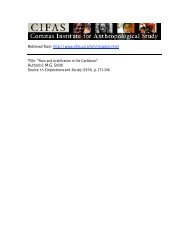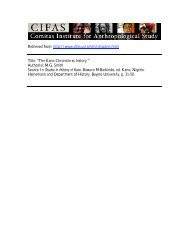- Page 1 and 2: Retrieved from: http://www.cifas.us
- Page 3 and 4: O:qord University Press, Amen HQUu,
- Page 5 and 6: CONTENTS PREFACE I. INTRODUCTION I.
- Page 7 and 8: BIBLIOGRAPHY INDEX GENEALOGY A. The
- Page 9: ... GOVERNMENT IN ZAZZAU institutio
- Page 13 and 14: " ment, and also more prosaically b
- Page 15 and 16: 16 GOVERNMENT IN ZAZZAU these chara
- Page 17 and 18: zo GOVERNMENT IN ZAZZAU tween power
- Page 19 and 20: .. GOVERNMENT IN ZAZZAU ing the sys
- Page 21 and 22: as GOVBRNMENT IN ZAZZAU 8trUctUre t
- Page 23 and 24: 3' GOVERNMENT IN ZAZZAU THE NATURE
- Page 25 and 26: i"., ;1 36 GOVERNMENT IN ZAZZAU ton
- Page 27 and 28: " GOVERNMENT IN ZAZZAU eunuchs coul
- Page 29 and 30: 4Z GOVERNMENT IN ZAZZAU rank, the v
- Page 31 and 32: +6 GOVERNMENT IN ZAZZAU action, whe
- Page 33 and 34: 50 GOVERNMENT IN ZAZZAU hold offici
- Page 35 and 36: 54 GOVERNMENT IN ZAZZAU system. and
- Page 37 and 38: 58 GOVERNMENT IN ZAZZAU political r
- Page 39 and 40: 62 GOVERNMENT IN ZAZZAU palace func
- Page 41 and 42: 66 GOVERNMENT IN ZAZZAU greatest ad
- Page 43 and 44: eKeno MAP A Abula and FuJani Zazzau
- Page 45 and 46: 70 GOVERNMENT IN ZAZZAU Muhammadan
- Page 47 and 48: 14 GOVERNMENT IN ZAZZAU The Sultan
- Page 49 and 50: 78 GOVERNMENT IN ZAZZAU military me
- Page 51 and 52: 82 GOVERNMENT IN ZAZZAU political o
- Page 53 and 54: LEGEND \ lKATSINA \ ~ni"l7$ updtuo
- Page 55 and 56: 86 GOVERNMENT IN ZAZZAU GOVERNMENT
- Page 57 and 58: 90 GOVERNMENT IN ZAZZAU related to
- Page 59 and 60: 94 GOVERNMENT IN ZAZZAU etc. Neithe
- Page 61 and 62:
98 GOVERNMENT IN ZAZZAU and forward
- Page 63 and 64:
GOVERNMENT IN FULANI ZAZZAU. 1865 1
- Page 65 and 66:
104 GOVERNMENT IN ZAZZAU families a
- Page 67 and 68:
108 GOVERNMENT IN ZAZZAU needed loy
- Page 69 and 70:
lIZ GOVERNMENT IN ZAZZAU practice o
- Page 71 and 72:
n6 GOVERNMENT IN ZAZZAU Karami. Oth
- Page 73 and 74:
no GOVERNMENT IN ZAZZAU council of
- Page 75 and 76:
124 GOVERNMENT IN ZAZZAU would be d
- Page 77 and 78:
128 GOVERNMENT IN ZAZZAU tinuity in
- Page 79 and 80:
13"' GOVERNMENT IN ZAZZAU in battle
- Page 81 and 82:
". GOVERNMENT IN ZAZZAU Barkin Zana
- Page 83 and 84:
14Cl GOVERNMENT IN ZAZZAU strategem
- Page 85 and 86:
144 GOVERNMENT IN ZAZZAU head of th
- Page 87 and 88:
148 GOVERNMENT IN ZAZZAU that over
- Page 89 and 90:
15Z GOVERNMENT IN ZAZZAU Abdulkerim
- Page 91 and 92:
156 GOVERNMENT IN ZAZZAU 61led thei
- Page 93 and 94:
160 GOVERNMENT IN ZAZZAU by his own
- Page 95 and 96:
164 GOVERNMENT IN ZAZZAU Sakota to
- Page 97 and 98:
l68 GOVERNMENT IN ZAZZAU his access
- Page 99 and 100:
17-'.1 GOVERNMENT IN ZAZZAU immedia
- Page 101 and 102:
116 GOVERNMENT IN ZAZZAU illegitima
- Page 103 and 104:
180 GOVERNMENT IN ZAZZAU himself fu
- Page 105 and 106:
18+ GOVERNMENT IN ZAZZAU status and
- Page 107 and 108:
188 GOVERNMENT IN ZAZZAU under a sl
- Page 109 and 110:
19% GOVERNMENT IN ZAZZAU mainly res
- Page 111 and 112:
196 GOVERNMENT IN ZAZZAU gora. Such
- Page 113 and 114:
200 GOVERNMENT IN ZAZZAU north. Mor
- Page 115 and 116:
%0+ GOVERNMENT IN ZAZZAU ministrati
- Page 117 and 118:
zog GOVERNMENT IN ZAZZAU rul~d Zari
- Page 119 and 120:
.21.2 GOVERNMENT IN ZAZZAU terms of
- Page 121 and 122:
:u6 GOVERNMENT IN ZAZZAU counting a
- Page 123 and 124:
GOVERNMENT IN ZAZZAU were quick to
- Page 125 and 126:
'.. GOVERNMENT Administration, who
- Page 127 and 128:
228 GOVERNMENT IN ZAZZAU the patter
- Page 129 and 130:
232 GOVERNMENT IN ZAZZAU tended to
- Page 131 and 132:
,,6 GOVERNMENT IN ZAZZAU There are
- Page 133 and 134:
2fO GOVERNMENT IN ZAZZAU difference
- Page 135 and 136:
'44 GOVERNMENT IN ZAZZAU domination
- Page 137 and 138:
THE GOVERNMENT OF ZARIA IN 1950 :14
- Page 139 and 140:
248 GOVERNMENT IN ZAZZAU heads stil
- Page 141 and 142:
~5" GOVERNMEKT IN ZAZZAU together w
- Page 143 and 144:
256 GOVERNMENT IN ZAZZAU consequenc
- Page 145 and 146:
260 GOVERNMENT IN ZAZZAU to seek re
- Page 147 and 148:
=b GOVERNMENT IN ZAZZAU Authority u
- Page 149 and 150:
,66 I. Generat-tu (1uJraji) a. COlt
- Page 151 and 152:
1.70 GOVERNMENT IN ZAZZAU proximate
- Page 153 and 154:
GOVERNMENT IN ZAZZAU tained 252,000
- Page 155 and 156:
,,8 "GOVERNMENT IN ZAZZAU THE GOVER
- Page 157 and 158:
~1 GOVERNMENT IN ZAZZAU unit in its
- Page 159 and 160:
a86 GOVERNMENT IN ZAZZAU which cent
- Page 161 and 162:
290 GOVERNMENT IN ZAZZAU ment, some
- Page 163 and 164:
8 GOVERNMENT AND STRUCTURAL CHANGE
- Page 165 and 166:
ltgS GOVERNMENT IN ZAZZAU governmen
- Page 167 and 168:
3.' GOVERNMENT IN ZAZZAU GOVERNMENT
- Page 169 and 170:
J06 GOVERNMENT IN ZAZZAU time to de
- Page 171 and 172:
310 GOVERNMENT IN ZAZZAU Fulani, dy
- Page 173 and 174:
31+ GOVERNMENT IN ZAZZAU an'th thei
- Page 175 and 176:
318 GOVERNMENT IN ZAZZAU ing develo
- Page 177 and 178:
32a GOVERNMENT IN ZAZZAU political
- Page 179 and 180:
3 z6 GOVERNMENT IN ZAZZAU the Nativ
- Page 181 and 182:
9 CONCLUSION OUR study has three pr
- Page 183 and 184:
334 GOVERNMENT IN ZAZZAU 7- The chi
- Page 185 and 186:
338 GOVERNMENT IN ZAZZAU (II) Kunke
- Page 187 and 188:
34% GOVERN,;MENT IN ZAZZAU given to
- Page 189 and 190:
',1 •. OFFICE.HOLDERS UNDER VERO
- Page 191 and 192:
APPENDIXC STATE TITLES AND ASSOCIAT
- Page 193 and 194:
APPENDIX E (I) APPENDIX E (.) Some
- Page 195 and 196:
INDEX AMdie. Cqltllin, :loa Abaji,3
- Page 197 and 198:
,6, Fenility, Hau~a, 38:1-3 Fiefs,
- Page 199 and 200:
Magajin Glri-tlOIlt. 98: royal rank
- Page 201 and 202:
37 8UCl:C8S;On to king~hip_ltI. Sok
- Page 203 and 204:
WOMBAI nOKO II r GALADIMA DOKAJE I
- Page 205 and 206:
M. KA'1 M. KILBA S. Z. AUDUSALAMI M
- Page 207:
ABBAS BM'AYAU MAGAJI DAKEIIBI BALEN





